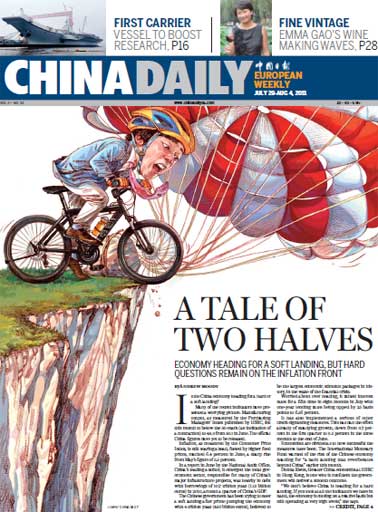Realty still hot for long-term players
Updated: 2011-07-29 11:37
By Shen Hongpu (China Daily European Weekly)
|
 |
China's property market is likely to witness a fresh round of tightening, following Premier Wen Jiabao's recent statement urging local governments in second- and third-tier cities to curb home purchases when real estate prices rise rapidly.
The restrictions will be an extension of similar policies implemented last year in big cities like Beijing and Shanghai, where families are not allowed to buy a third home.
That seems to suggest that property price rises in smaller cities - where many foreign investors had recently increased their investments - will slow down. Prices could even fall.
Figures from the National Bureau of Statistics showed that in June property prices fell in 12 of the 70 major cities monitored, and remained unchanged in 14, measured against figures in May. That indicated that China's property sector continued to cool as the effect of tightening policies became evident.
The scenario also sparked fresh calls to steer clear of Chinese property stocks and the realty market.
On June 15 Standard & Poor's cut its outlook on Chinese property developers from "stable" to "negative", citing the possibility of further government curbs. In April Moody's Investors Service changed its outlook for the Chinese property sector to "negative" from "stable".
In recent times, there have been several telltale signs that the Chinese government is keen on curbing the skyrocketing property prices and to prevent the real estate sector from overheating.
Such concerns arise as the fast-growing property market drains a considerable chunk of existing financial resources and leaves the local government reliant far too much on land sales to boost revenues. If this trend is not rectified, then China will suffer a fate similar to what Japan underwent in the early 1990s, when a realty market collapse almost derailed the growth phase of the Japanese economy.
But at the same time, the government is also keen to ensure that the property sector is curbed. An ultra-buoyant property sector is considered not good in China's economic transition from manufacturer and exporter to a consumer. This is especially so as higher realty expenses will considerably reduce the funds available for spending on other items.
That scenario will also lead to an ailing economy and deter innovation and industrial upgrading. After all, there is no major economy that simply relies on the growth of the property sector to become wealthy and healthy. So it becomes more clear as to why the Chinese government is willing to risk an economic slowdown to check the runaway property market.
Foreign investors, however, have braved the tightening policies and increased their property investments in China to $26.6 billion yuan (18.51 billion euros) in the first five months of the year, a year-on-year growth of 57.3 percent.
With uncertain winds blowing across the property sector, there is also apprehension among several foreign investors on whether they should continue to stay invested in the realty sector or to exit it totally.
In my opinion, there is no need for foreign investors to consider getting out. Rather it would be better if they can adopt the right strategy that will still give them good returns on their investment. Since most of the tightening policies are targeted at residential property purchases, the commercial property sector, including retail and office spaces, are less likely to be affected by the new regulations.
Shanghai is an ideal example of a region where commercial realty prices have risen sharply. Growing demand and limited availability have increased the monthly average net effective rental rates for Grade A offices to 391 yuan (42 euros) per square meter during the second quarter of this year, an increase of 7.7 percent quarter-on-quarter, according to Cushman & Wakefield, a US-based property consultant.
Vacancy rates of retail property in Shanghai's major shopping areas were at a low of 4.4 percent during the second quarter, while net effective rental rate rose to 1,821 yuan per square meter per month, climbing 0.28 percent quarter-on-quarter.
In Beijing, the monthly rental rate for Grade A offices jumped 13.6 percent quarter-on-quarter to 366 yuan per square meter.
All of these trends indicate that the commercial property sector is still hot and capable of offering healthy returns on investment.
Despite the property market tightening, affordable housing is one segment that will still gain, thanks to the strong government backing.
As a crucial and important measure to prop up the real estate market, the central government has called for construction of more affordable homes for low-income groups. It plans to spend 1.4 trillion yuan to build 10 million such homes this year. However, only 30 percent of these homes were built or were being built in the first five months of the year, which means that 930 billion yuan will be invested in the second half of the year.
Although the profit margin is lower than other types of residential areas, affordable housing offers stable returns and carry little risk due to the strong governmental support.
Foreign investors can form joint ventures with, or lend to, local players, who are facing an acute shortage of capital due to the tightening measures. With most of the Chinese property developers keen to stay afloat, there will be many opportunities for foreign investors who are willing to invest with a long-term view.
The liquidity crunch will force many Chinese developers to let go of their bargaining powers at the negotiating table. So it is the right time for foreign investors to start pursuing the right targets. Cash-strapped local developers, who were once reluctant to share their profits with foreign players, will also be keen on getting external funding.
But while selecting the potential partner or acquisition target, foreign investors should carefully weigh the size of the land reserves of Chinese counterparts before taking investment decisions. Land is the lifeline of the industry and hence not reproducible.
The author is an independent economics commentator.
E-paper

Ringing success
Domestic firms make hay as shopping spree by middle class consumers keeps cash registers ringing in Nanjing
Mixed Results
Crowning achievement
Living happily ever after
Specials

Ciao, Yao
Yao Ming announced his retirement from basketball, staging an emotional end to a glorious career.

Going the distance
British fitness coach comes to terms with tragedy through life changes

Turning up the heat
Traditional Chinese medicine using moxa, or mugwort herb, is once again becoming fashionable
